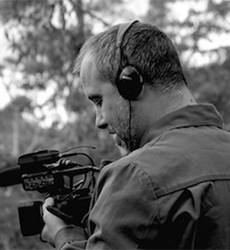

Instructors:
Charley Scull, Practica Group
Nicholas Agafonoff, The Practical Insights & Real Ethnography
REGISTRATION IS CLOSED
Tuesday, 9 October, 9–12:00, East-West Center
25 participants, fee: $100
Getting from raw to cooked—it’s the work that all of us do as we attempt to make sense of the data we gather ethnographically. But how does this transformation play out in the context of film and video and how are notions of “truth”, intention, authorship, and authenticity complicated through the power of visual media?
This tutorial explores a variety of stages on the path to final video deliverable: from the initial decisions of how, what, and whom to shoot, through the analysis of raw footage, the assemblage stage of editing, and on to the final cuts. Final deliverables could be short sequences embedded in PowerPoint decks, standalone documentaries or multiple versions of the same research findings that shrink in duration as they move higher up client food chains, to name but a few outcomes. At each stage, opportunities for reflexivity and engagement will be identified and critical attention will be paid to the unique power and responsibility that is intrinsic to film and video. Drawing on illustrative examples from the work of the instructors, we will de-construct final products and show how “raw” and “semi-cooked” materials can be used for observational data, collaborative analysis, and story-telling purposes along the way. We’ll also unpack the ways in which insights and meanings are always joint constructions, in the end, that exist at the nexus of client goals, authorial desires of the ethnographers and filmmakers, and the voices of the subjects themselves.
In the second part of the tutorial, participants will draw from the language and lessons learned earlier to “workshop” their own projects—past, current, planned, or imagined. Working in small groups and using participant-provided project descriptions or short video examples, we will map out workflows as projects move through the various stages of development and application.
Participants will leave the tutorial with a deeper understanding of the ways the visual “evidence” we provide can inform, compel, and reinforce different needs and perspectives—as well as the great responsibility that comes with this ability to represent people and influence outcomes.
Charley Scull has worked in the consumer insights and innovation spaces since 2005. His work has spanned a range of industries and focal lengths: from the granularity of package design and communication programs, to local issues about audience engagement for a botanical garden, to system-focused questions in healthcare spaces, global seafood supply chains and the future of mobility. Charley was trained as a visual anthropologist and that visual sensibility, as well as a cultural framework of analysis, and a continued practice of using video in his work, remain core strengths of his approach. In addition to extensive domestic work, he has also worked in Asia, Latin America, and the EU. Since 2011 Charley has been a partner at Practica Group, a qualitative consumer research firm that provides strategic consulting based on ethnographic cultural analysis of consumer practices. He holds an MA in visual anthropology and a PhD in cultural anthropology from USC.
Nick Agafonoff has worked as a commercial video ethnographer and qualitative researcher in Australia since 1998. His inquiry has spanned across government, not-for-profit and commercial research clients, exploring everything from military cultures, to hair removal product usage, from online video consumption behavior, to cultural branding of alcohol. Facebook, Google, Jack Daniels, McDonald’s, VW and Nike, are just a few of the global brands that Nick has conducted video ethnography inquiry for. Nick is widely known for his application of video and documentary storytelling to the commercial research context, and is expert in participatory and observational filmmaking techniques, ethnomethodological ‘disruptive’ techniques, auto-ethnography techniques, and, non-participatory techniques, such as Eye Tracking. Presently, Nick is the Director of Lived Experience at The Practice Insights and Director of Real Ethnography.
Tutorial registration is open to all EPIC2018 attendees. You can purchase tutorial tickets during conference registration, or login to your existing registration and add a tutorial. When tutorials fill you may join the waitlist, but we recommend registering for your second-choice tutorial, since we see very few cancellations.